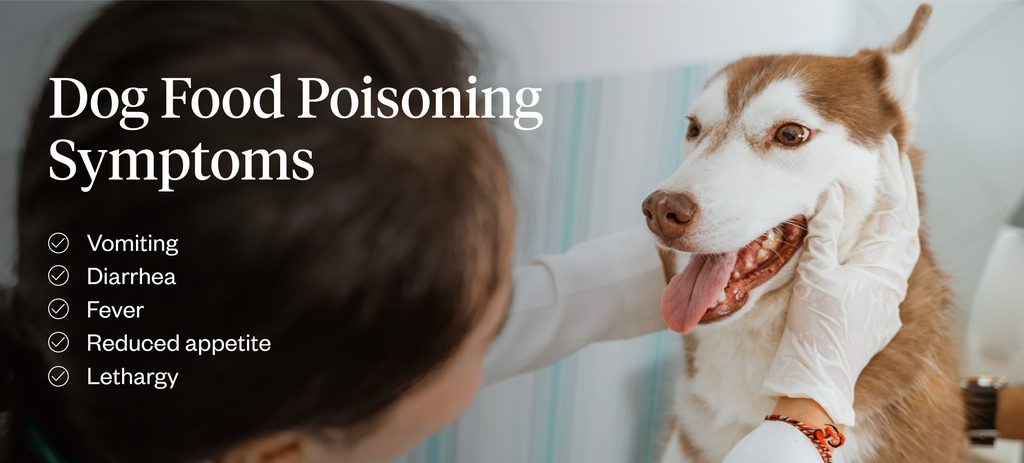9 Min Read
Can Dogs Get Food Poisoning?
Key takeaway

Why pet owners are switching to online vet care with Dutch
-
Prescriptions delivered free to you
-
Fast access to Licensed Vets over video
-
Unlimited video visits and follow-ups
As cherished family members, dogs often share our meals and treats, but what happens when the food they eat poses a threat to their well-being? Do dogs get food poisoning? Believe it or not, just like you, your dog can get food poisoning. While our dogs might seem healthy and robust, their digestive systems can be sensitive, making it crucial to recognize the signs of food poisoning and take proactive steps to ensure their health and safety.
Food poisoning in dogs can result from contaminated ingredients, improper food storage, and exposure to toxins. This article will discuss the common symptoms and causes of canine food poisoning, along with tips on what to do if you believe your dog has consumed something potentially hazardous. Keep reading to learn more about food poisoning in dogs.
- Dog Food Poisoning Symptoms
- What Causes Canine Food Poisoning?
- What to do if Your Dog Gets Food Poisoning
- FAQs
- Final Notes
Dog Food Poisoning Symptoms
Recognizing the symptoms of food poisoning in dogs is crucial for quick intervention. Common signs to watch out for include:
- Vomiting: Dogs may vomit repeatedly as their body tries to expel the harmful substances.
- Diarrhea : This may be accompanied by blood, indicating a more severe case of food poisoning.
- Fever: An elevated body temperature is a sign that the dog's immune system is responding to an infection.
- Loss of appetite: A sudden disinterest in food can be an early indication of digestive issues.
- Decreased activity level: Lethargy and a lack of energy may signal discomfort or illness.1
In severe cases, food poisoning can lead to organ failure, such as kidney or liver failure.2

What Causes Canine Food Poisoning?
Dog food poisoning primarily involves gastrointestinal upset caused by bacteria or toxins present in what they eat.
Food poisoning in dogs often stems from bacterial contamination, with short incubation periods between ingestion and illness. Foods commonly associated with bacterial food poisoning include milk and dairy products, sausages, gravy, and certain bakery products. Additionally, raw fish, undercooked meat, and eggs can pose risks.3
Salmonella, a bacteria that can reside in the intestinal tract of animals, may lead to infection if dogs consume contaminated food. This bacterium can be present in various foods and treats, including dry dog food, raw pet food, biscuits, pig ears, and beef hooves. Of course, it's also present in the human foods you might feed your dog. Symptoms of salmonella infection in dogs include diarrhea, bloody stool, vomiting, fatigue, fever, and loss of appetite.3
E. coli is another type of bacteria that can affect dogs. Contaminated food or beverages may include raw produce, undercooked ground beef, or unpasteurized milk. Symptoms include diarrhea, dehydration, vomiting, lack of appetite, lethargy, frequent urination, and bloody or cloudy urine.3
Listeriosis is another bacterial cause of food poisoning and can result from consuming contaminated poultry, meat, eggs, raw vegetables, or unpasteurized dairy products. Dogs can experience mild GI distress with symptoms that include diarrhea, vomiting, fever, muscle pain, lethargy, breathing problems, lack of coordination, and pregnancy loss.3
Aflatoxin is a fungal toxin contaminating crops like corn and can lead to dog food poisoning if ingested over extended periods. Dogs may consume aflatoxin through moldy corn, nuts, peanuts, or grains. Symptoms of aflatoxin poisoning include loss of appetite, lethargy, vomiting, diarrhea, and jaundice, with potential long-term effects on liver health.3
It's important to keep an eye out for recalled dog food or treats to prevent food poisoning and serious illness. Periodically checking resources like the FDA website for the latest information ensures that your dog's meals are safe and free from potentially harmful contaminants.4
So, can dogs get food poisoning like humans? The short answer is yes, but they often get food poisoning in different ways than their human counterparts. Keep in mind that it's often not dog food or treats that give our pets food poisoning; instead, it's what they consume outside of their regular meals. Dogs are known for their curious nature and sometimes indiscriminate eating habits.
Responsible pet ownership involves being vigilant about what our furry family members have access to, whether it's within the confines of our homes or during walks and other outdoor activities. A few ways dogs get food poisoning include:
- Garbage and compost: Dogs may view garbage as a culinary delight. However, the items found in the trash can be potential sources of food poisoning for dogs.
- Dead animals: Exploring the outdoors may expose dogs to dead or decaying animals. These carcasses can carry harmful bacteria or parasites, causing stomach upset and serious illnesses.
- Fecal matter: Dogs are often tempted by the various types of animal fecal matter they might find outside. Ingesting feces, whether on their own or from other animals, can lead to significant stomach upset.
- Raw or undercooked food: The raw dog food diet has grown in popularity over the last several years. However, mishandling these foods can lead to significant illness. Raw or undercooked meat, eggs, and bones can cause food poisoning, and bones may even create foreign bodies requiring surgical removal.4
What to do if Your Dog Gets Food Poisoning
If you believe your dog ingested something harmful, the best thing you can do is contact your vet. Professional guidance is essential to assess the severity of the situation and determine the appropriate course of action. Provide details about the symptoms, the potential cause of poisoning, and any recent changes in your dog's diet or environment.
Once your pet is at the vet's office for treatment, they have a few options. If your vet identifies a bacterial infection, they may prescribe antibiotics to combat the infection and promote a faster recovery.
Dogs with food poisoning typically require supportive care to manage their symptoms, such as vomiting, diarrhea, and dehydration. This may involve fluid therapy to maintain hydration levels and support their bodies as they naturally expel the toxins.
FAQs
What are the signs of food poisoning in dogs?
Identifying the signs of dog food poisoning is crucial for prompt intervention and ensuring their well-being. Here are common symptoms of food poisoning in dogs:
- Vomiting
- Diarrhea
- Fever
- Loss of appetite
- Decreased activity
- Fatigue
- Abdominal pain
- Dehydration
- Trembling, shivering, or shaking
How soon will a dog get sick after eating something bad?
How quickly a dog vomits or has symptoms after eating something bad can vary widely based on factors like the specific toxic substance, the amount ingested, the dog's size, and overall health. In many cases, signs of food poisoning or toxicity may appear within a few hours to a day, but it can sometimes take several days for symptoms to manifest.
Certain toxins may cause more immediate reactions. For instance, if your dog ingests common poisons like a plant, it may rapidly irritate the digestive system. The dog may experience vomiting or diarrhea in just a few hours.
On the other hand, some toxins or bacteria have a longer incubation period, meaning it can take days for symptoms to become apparent. In cases of bacterial contamination, it can take anywhere from a few hours to a few days for your pet to appear sick.
Regardless of whether your dog is showing symptoms, if you suspect they ate something they shouldn't have, it's always best to contact your vet. They'll provide guidance and next steps to help you manage the situation and ensure your dog's health.
How do dogs act when they eat something poisonous?
Foods that are toxic to dogs can cause various symptoms and potential behavioral changes. The most common signs your dog has eaten something toxic are vomiting and diarrhea, which are the body's way of expelling the toxin. Dogs may also experience lethargy and loss of appetite.
In some cases, toxic substances can also affect the respiratory system, leading to difficulty breathing or rapid breathing. Some dogs may also experience tremors or seizures due to toxin exposure.
Unfortunately, the symptoms of food poisoning in dogs are also symptoms of various other diseases and illnesses. If you don't know whether your dog ate something, you can't assume it's food poisoning.
Regardless of what your dog ate or if you don't know if they ate anything at all, you should always contact your vet if you notice any symptoms of illness in your dog. Whether they're lethargic or vomiting, it's always better to err on the side of caution and have your pet examined as soon as possible.

Final Notes
Being aware of the potential risks and signs of food poisoning in dogs is crucial for responsible pet ownership. Contaminated ingredients, improper food storage, and exposure to toxins are common culprits of this illness.
If you suspect your dog has consumed something harmful, quick intervention is key. Contact your veterinarian immediately, providing details about symptoms and potential causes.
Unfortunately, sometimes, our dogs' food and treats can make them sick. Finding the proper diet and high-quality dog food for your pet can reduce the chances of them developing GI issues due to the food they consume on a regular basis. Try Dutch telemedicine for pets to talk to a licensed vet who can provide diet and nutrition advice to ensure your dog is eating the best food for them.
All of our membership plans come with unlimited follow-ups and prescriptions delivered right to your door! Sign up today.
Share
References
-
Treiber, Lisa. “Pets and Food Poisoning: It’s Not Just Humans.” MSU Extension, 21 Jan. 2022, www.canr.msu.edu/news/pets_and_food_poisoning_its_not_just_humans.
-
“Offering Spoiled Food Is No Way to Spoil Your Pet.” VMBS News, 29 June 2023, vetmed.tamu.edu/news/pet-talk/spoiled-food/.
-
“Can Dogs Get Food Poisoning?” American Kennel Club, American Kennel Club, 13 Feb. 2023, www.akc.org/expert-advice/health/can-dogs-get-food-poisoning/.
-
“Can Dogs Get Food Poisoning?” PetMD, www.petmd.com/dog/emergency/poisoning-toxicity/can-dogs-get-food-poisoning.



